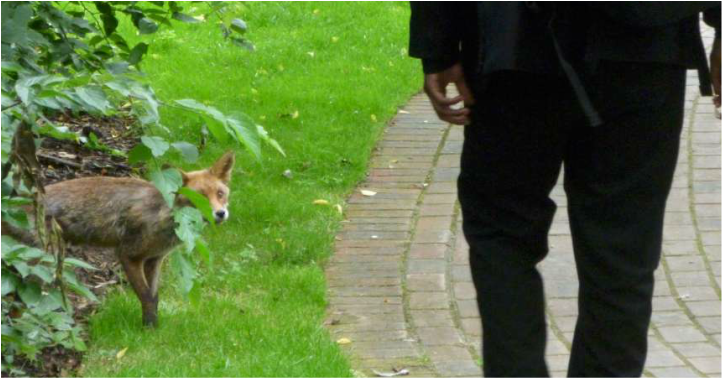This being inner London, we've had foxes coming round before, of course. Never until I moved to this city had I seen that many of them. Quite often you encounter foxes here in broad daylight and, to be honest, I'm actually quite partial to them. I used to love observing them from my bedroom window at night, thinking how strange and wonderful in some ways it is that they follow man (or rather: his food) into the built up environment. Our road has no trees, all asphalt and concrete. Gardens are tiny and hidden behind high walls, most of them paved over to become patios or parking spaces or are more or less neglected grassy patches.
Up until watching it myself though, I would not have believed foxes capable of scaling walls more than two metres high and balancing like a cat on fences no more than 4 cm wide. Our small patio garden is enclosed by these on all sides, and often we have observed a fully grown animal trotting along our boundaries, seeming astonished rather than scared when we flashed the torch at them. Hesitating, as if unsure whether to continue in its tracks or not, making a hasty retreat or swift exit only if we made loud noises: ordinary shooing certainly did not seem to bother it.
But last autumn a newcomer seems to have arrived who decided our garden was its declared foraging territory for snails, slugs and earthworms - and whatever else foxes feed on apart from leftover sandwiches, chips, fleshy fried chicken bones and the rest of urban goodies. So now I find not just the soil from the beds scratched and spilled onto the patio slabs but, more annoyingly, the planted-up pots rummaged through.
Especially the bulbs and the houseleeks (Sempervivum) are uprooted, dug out, strewn around and left to rot and freeze - or to dry and shrivel, depending on the weather - if I don't notice immediately. At first I suspected the blackbirds, but I don't think they could do that much damage - and why would they change their behaviour all of a sudden. When some pots were knocked over this seemed to finally prove it.
I've heard people recommend leaving dog hair around, the assumption being that the smell would scare the foxes off. I don't have a dog. Neither do people whom I know well enough to ask if they could regularly shear their four-legged friend for my garden's benefit. Because you'd have to renew the dog hair regularly, won't you? I suppose it would be blown about and lose its "trade mark dog smell" pretty soon if left in the open. Truth be told - I very much doubt any London fox would care about a bit of unaccompanied hair, fresh or not. My guess is that even a barking dog behind a glass door wouldn't put them off for long.
Apart from that, I try to be philosophical about it. So far, the damage is not threatening my gardening and while not exactly happy, I can live it. Gardening in this inner urban and very enclosed space, I don't have badgers or moles to content with, for instance, nor - as my sister in a rural setting has - with roe which regularly come to nibble off every single rosebud just as they are about to unfurl. As I said, I don't have a dog to regularly patrol and scent-mark the plot and so far wouldn't dream of using more drastic measures to rid my garden of the foxes.
Though it may not count as "proper gardening", I think I will treat myself to potted lilies in bud from Columbia Road Flower Market this year.
And next time I grumble when re-potting those alpine gentians or houseleeks, I'll try to recall that night a few years ago when I observed three or four fox cubs playing. The builders had left a pile of insulation wool across the road and these cubs were using it to slide down the soft heap again and again and again for what seemed like hours. Just like toddlers in a playground! The sight would have made anyone's heart melt.




 RSS Feed
RSS Feed